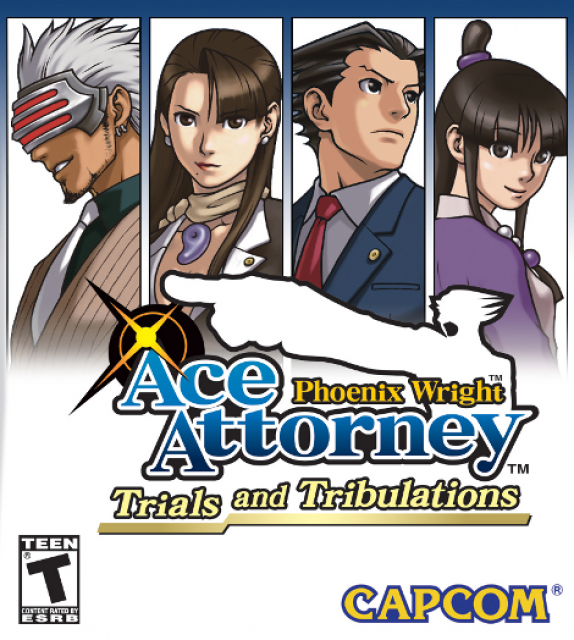On Phoenix Wright: Ace Attorney - Trials and Tribulations
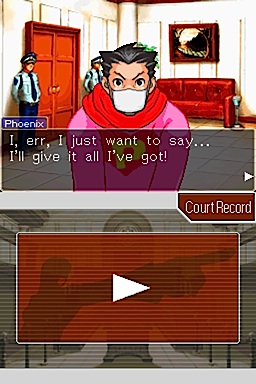
The Ace Attorney games are probably best classified as point-and-click adventures, although being on the DS, calling them point-and-tap is probably a bit more accurate. These games aren't designed to challenge your skill and reflexes so much as your ability to think through situations logically. You're investigating crimes and defending the accused, not fighting off the forces of darkness. It should be noted that while this is technically a review for Trials and Tribulations, the first three games in the Ace Attorney series play essentially identically to one another in almost every way, so if this sounds like it's up your alley, you could pick up pretty much any game in the series and enjoy it.
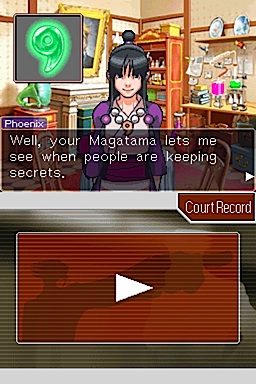
The game mostly does a pretty decent job of letting you know who you should be talking to and what you should be asking. On a few occasions, though, I did find myself stuck somewhere with no real indication as to how I should progress. Most often this was because I'd missed some small action necessary to trigger an event elsewhere. This can be a little frustrating, because the event you trigger may have no apparent connection to the action that triggered it. Luckily, there aren't any consequences for making mistakes in your investigation, so if you get stuck you usually have the option of brute-forcing it by asking everyone every possible question and presenting them with every item in your inventory.
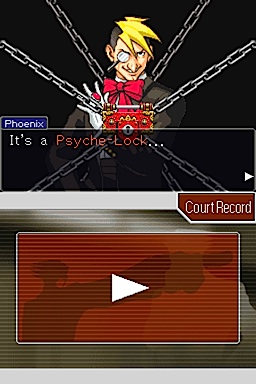
The meter used in interrogation is also present in the other major component of the game; the trial. When in court, the gameplay switches to a more restrictive structure than during investigation. During the trial, your primary function is to listen to and find contradictions in witness testimony. You can press witnesses for more information if you feel you need it, and you will from time to time. Sometimes the original testimony will have no contradictions, and pressing the witness will give you what you need to move forward. Once you've found the contradiction, you present the piece of evidence that disproves the testimony and the trial moves on to the next stage.
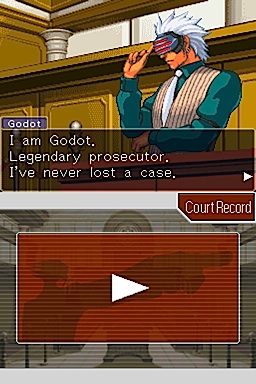
As with most Japanese games, there are some things that just couldn't translate perfectly in the localization. The developer's solution to this problem was to change the setting from Tokyo to Los Angeles, which at times actually seems to create more confusion than it prevents. First and foremost, anyone playing this game needs to dispense with notion that the defendant is innocent until proven guilty, and that guilt must be proven beyond the shadow of a doubt. The game is ostensibly set in L.A., but it's based on the Japanese justice system, although even that's not entirely correct; it's really based on an exaggerated anime conceptualization of the Japanese justice system. In the world of Phoenix Wright, courts accept testimony provided by dead people through spirit mediums, and the defendant is considered guilty until his defense attorney not only proves the defendant's innocence, but also proves the guilt of the true criminal. It's tough being
a defense attorney in Tokyo—I mean, Los Angeles.
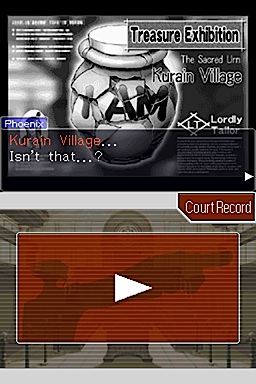
The stories the game tells are really solid, too. You're essentially running around solving a series of murder mysteries, and they're all well-told, with plenty of twists and turns. I'll admit that I'm no Columbo. Heck, I'm not even Dick Van Dyke, so you'll probably want to take what I'm about to say with a grain of salt, but I found myself genuinely surprised with the outcome of more than a few cases, and the stories are bolstered by the strength of their characters. Along with the games titular ace attorney and his friends, you'll be introduced to a load of strange and quirky characters. If I wanted to be picky, I could point out that a lot of them engage in pretty stereotypical anime character behavior, but they're all likable and will probably feel unique to anyone not terribly familiar with Japanese television.
The Ace Attorney is a great example of the kind of games I'd like to see more of on the DS. Ultimately, all of the little problems I had with the gameplay weren't enough to keep me from immensely enjoying my time with Trials and Tribulations, and the weird little cultural foibles only added to the game's already strong personality. If you're into point-and-click games, I definitely recommend this one; and if, like me, you're still not entirely sold on the idea of touchscreen gaming, this one might just make you into a believer.

